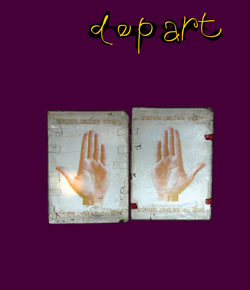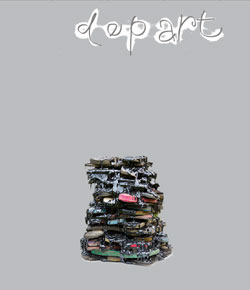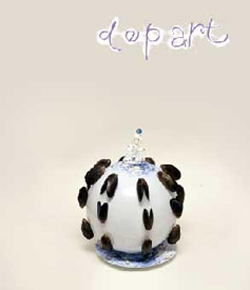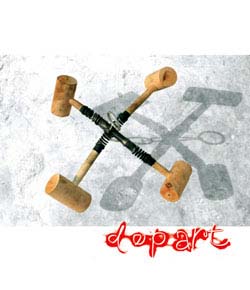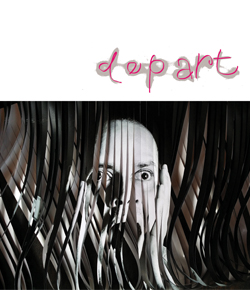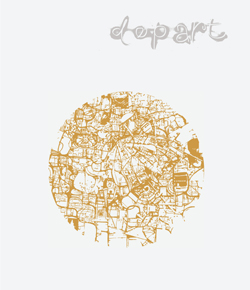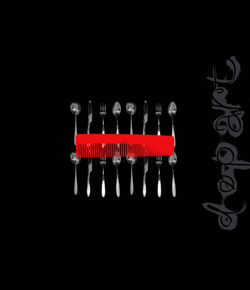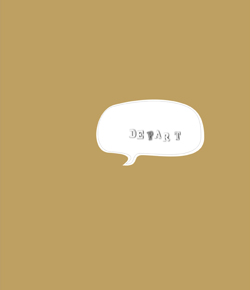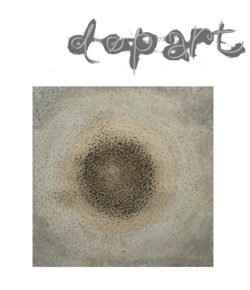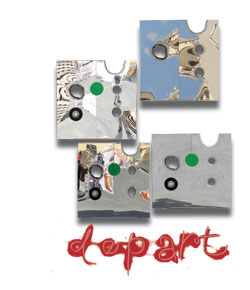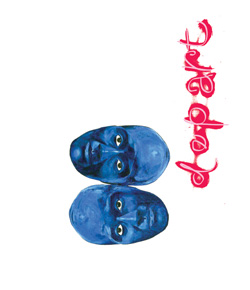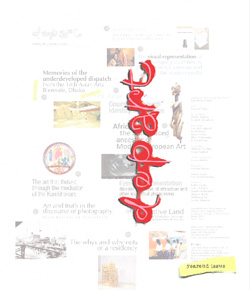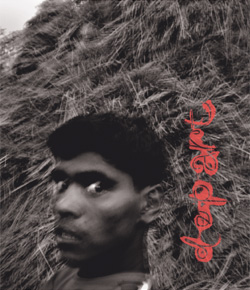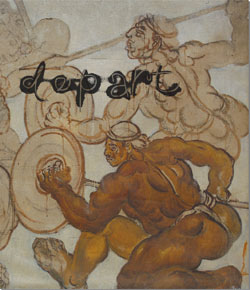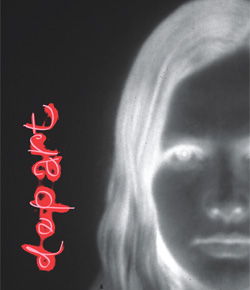subject / predicate
Lalon, (con)textualized
Farhad Mazhar answers five questions on Lalon and his school of thought that forms the apex of both artistic and philosophical practices centered on what once was Nadiya in the geographic sense and now has taken over the philosophical landscape of Bangladesh
Depart: Why do we as Bangalees need to take stock of what Lalon had to say about existence, time and eternity; is it merely a project centered on mapping our own epistemic pool?

Farhad Mazhar: Fakir Lalon spoke and sang in Bangla language but to call him a “Bangalee” is highly problematic, if not wrong. Yes he is from Bangladesh and Bangla was his language. He is a Bangalee in a descriptive sense. By accident he was born here, stayed in Chheuria, Kushtia, composed his “kalams” in Bangla. The Arabic word kalam literally means text, but in Nadiya, the philosophical school of which Lalon is the apex. Kalam does not merely mean divine text but text that can be translated into material being -- words that can be transformed into reality.
Bangla was Lalon's mother tongue, but that was an historical accident, he could have arrived anywhere in the world and dwelt in any language. Lalon, in this sense, was and still is global.
Why he is not a “Bangalee”? Although we take it for granted that the word Bangalee is politically and philosophically neutral, but this is not the case. With Lalon this is even more so.


First of all the word “Bangalee” is associated with a very particular identity politics at present, and Lalon had always been vehemently opposed to all forms of identity politics. It is not worthy for human beings endowed with universal spirit – the “One” -- to identify her spirit with anything related to a particular space, time and history. Spirit is never divided. The difference that
Lalon makes between “kupjol” and “Gangajol” illustrates this position; Water that is deposited in a drain can not be as same as the divine water of the River Ganga.
On the other hand Lalon did not believe in any transcendental being as in theology or in the so called “maromi” or “addhatik” discourses. Human beings are “shahoj” – dwellers in language where ontic and the ontological become “bartoman”. Human beings are not merely biological beings, but biological beings with the capacity to go beyond biology and live in divinity proper to human beings’ “swabhab” or nature.
Simply speaking, human beings are interesting architecture, a form where we can see and observe how spirit (in Lalon's term “odhora”) makes a claim on this “baramkhana” – the place of the “odhora”.
The claim of the “odhora” in biological human beings in a particular time and place is called “bostu”– where ìodhoraî sits or dwells.
The word “bostu" has been completely degraded, as it is now used as a translation of the English word “matter”. Its etymological root lies in “bosh”, from where we derive the word “bosha” or to sit. Bostu is where “odhora” sits or dwells and remains available for our senses to feel, and to be described through language.
However, surprisingly, when “odhora” dwells in human beings, in human “bostu”, it becomes “bedantor” (Vedantor in Sanskritized transliteration) it defies all linguistic framework, one can not grasp it through language or by any system of signs any more– it transcends all existing “bed” (or Veda)– religious texts, epistemological claims or philosophical discourses, and “shastro” or texts that are source of law, rules or order that are implemented by ‘force’ or ‘violence’.
Lalon's position on existence, time and eternity is a huge subject that can not be dealt in a few words. All these epistemic categories you are using are very much Western. In the philosophical discourse of Bengal, from where Lalon cast his position, certainty of knowledge has no place as such. This is very much a Greco-Christian problem.
In the Jain, Buddhist, Shankhya school of thought and other anti-Boidik (or Vedic) Hindu1 traditions as well as in Islam, certainty of knowledge was never a fundamental philosophical issue. It was rather how the “jeeb” could be liberated, or get to the “nirvana” that was their central theme. In other words epistemological questions were not issues independent of ethico-political act of the individual in the society to make a lifestyle consistent with divine presence or “dhormo”.
In Islam the issue has always been how to obtain the qualities of Allah as his Khalifa on earth, while he* is absent in time and space: how to become the “caretaker” of his creation or his “Bishwa Bagan” -- the world-garden. All this is subsumed by us simply to prove and demonstrate through practice that we humans are not merely biological beings. But again, this must be proved and demonstrated only through the biological life that is given to us both as our material existence and also as a means to transcend the biology by cultivating our capacity to become the “subject” or an “agent” that change the present by living in the present. To be divine in this sense is to remain eternally “bartoman”, to exist as “prokriti” or nature has endowed each of us with the quality of becoming both the Subject and the Process.
With this capacity to use the given material, “parom” claiming the “jeeb" as the ‘means of production’ to become the “divine" is a very unique idea in Lalon's school developed in Nadiya.. “Divinity” here is a material concept; it has absolutely no mystic, 'maromi' or any teleological orientation. In contrast, the task of the human subjectivity is not, as we see now, to remain trapped merely into a biological frame, but to become a higher form of consumers than that of the other biological beings such as we are in capitalism, imperialism or the “Empire”.
Following Western philosophical paradigms we may rephrase the question as what would be the proper “ethico-political” acts of human beings, so that she can prove that her particular being is not merely a piece of biology? However, such questions are being asked only recently as a Postmodern inquiry. The claim is made that it is proved by demonstration that human beings are “historical” entities capable of making history. But this very concept of “history” is conceived merely as the continuity of biological evolution.
History in this paradigm is the history of a biological being. Postmodernity is aware of this problem but so far has failed to come to a conclusive position that can endorse a “politics” or “acts” that are proper to divine beings, i.e., “jeebs” endowed with the capacity to become “parom”.
Claiming history as merely a metanarrative, an imagination or merely a discourse, etc., make the problem more complex and deeply problematic, since the relation between words and things (or reality and the representation) remains unresolved.


In contrast, Lalon grew within a tradition where the questions were how the “jeeb” or the biological being limited by space and time can be freed from aging, morbidity and death. This is the reason why “jente-mora” (living as if one is a dead person) as a concept is rich in ethico-political implication in Lalon’s school.
One must die before death arrives in the biological sense so that as a divine being he can taste and compare both biological life and the life of the divine: living without any biological “desire” but desiring the divine or “parom” in the “bartoman” – in the present and live accordingly. In other words, to cultivate the divine subjectivity, i.e., politics that makes human history as the history of the Divine Being against the history of the Capital, including fossil fuel-based civilization. This is profoundly fundamental to Lalon’s politics. “Divine” life is not outside biological life and death, and also never outside the society of the MANY, never outside the global community of ONE.
To die now by discarding the desire of the biological being is not to become an ascetic who does not take life seriously. But to “enjoy” biological life in a way so that “divine” can be tasted as “bartoman”, as now, or as the possibility to create through ethico-political revolution, that starts from changing the personal lifestyles so that the world of the biological beings can also be changed or transformed.
In absence of MANY, the word ONE has no meaning. In contrast to the so called “multiculturalism” Lalon was proposing the radical intercultural unity or relation that does not eradicate the diversity of “bartoman”.
A profound concept he might have absorbed from the Abrahamic call for the unity of all beings which continued in Islam through the political concept of “ummah”.
To free human beings from all earthly bondage of tribe, blood, land, language, culture, etc., the claim that only the “parom” is worthy of being worshipped by human beings is not an epistemological determination, but a political necessity to unite the diverse human kinds endowed with divinity. The concept has been degraded to the communal level because of the dominance of the so called “Muslim ummah”.
To Lalon followers, this is a fundamental departure from the teachings of Islam. I am raising these points to provide some hints how Nadiya School has absorbed Islam in a way that is unique in the world. Lalon is a revolutionary, but not to make human beings a better animal or a better consumer in a capitalist-materialist-industrial world. This is the reason the conventional notion of socialism and communism is not acceptable to his followers, i.e., making biological beings more materialistic by reducing them into consuming machines in order to resolve the contradiction of global capitalist order. The era of divine revolution with the capacity to absorb all the best achievements of human kinds including Marx, Lenin and Mao Ze Dong is here. We need a step forward to the direction appropriate for us. Revolution is a divine act.
He is a revolutionary for beings who are proper for human beings with “divine” capacity. Here, divine does not represent a perverted or degraded concept which is now being fashionably used in the so-called “new age” movement. Such symptom is related to the tragic personal effort of individuals living in the capitalist societies merely as consumers – like any biological animals.
If we fail to note these fundamental differences between Bengal's discourse and that of the West – particularly those that came via Modern Western philosophy, including revolutionary ideologies -- we will hardly be able to understand persons like Fakir Lalon Shah, or even the Nadiya School, which is a political movement, of which Lalon forms the apex.
Note that I use very consciously the category “Nadiya” -- which was Lalon's school, and I also qualify this school as “political” and not “epistemological” or “spiritual”. Lalon was not an “addhattik” or “maromy” mystic. Such conventional assumptions should be discarded immediately.
We must not forget that “Nadiya” fought against caste/class, patriarchy and all forms of hierarchies not consistent for the “jeeb” seeking the grace of “prem” (love in its all-encompassing form). So the question you are asking as they prevail in conventional stories about 'bauls' is in a sense irrelevant to Fakir Lalon Shah. How things exist or how we exist is more of a Descartian problem and not at all related to the political project of Lalon.
He prompts us to ask: how could we get rid of caste, class and use of women as an instrument in Tantric practices. Lalon was vehemently critical of the Tantric schools that came before him, despite the fact that he recognized their practice as the early materialist philosophies that took body as a material being and the primary object to explore, experiment with as part of the knowledge practice. Nevertheless he hated reducing women to an instrument of Tantric meditation. His “jugol” shadhona is obviously different from the tantrics’ and also distinct from the Boishnabs’ as well. Nadiya school is not the same as Brindabon school, which is the re-appropriation of Chaitanya by the upper caste Brahmans2.
Apparently Lalon used the word “time” in two senses. One as we generally use in our language – the time in our watch. When you listen to his song, 'Shomoy gele shadhon hobena' – you can interpret the word as is described. But soon you would realize he is also unraveling a different meaning of time, similar to what we understand by “joag”– the moment when the universe become ONE in a “palok”, or a blink of an eye – completely effacing the difference between all beings existing in time and place. That is why the second sentence in this song is, 'Din dhoriye tiner shadhon keno korlena.' Here we see time is related directly to “shadhon” or the act of relating to the universe with her regenerative cycle as a whole.
There is no separation between Subject and Object in this Oneness. The paradigm that presupposes subject as the agency that knows and the object as outside the subject to be known, has no dominant place in Lalon's discourse. So, such “joag” or act of becoming happens not as an act of epistemology but the divine moment of experiencing the One.
There are certain practices that Lalon called “koron” (not Tantra, please) that you learn slowly the way you keep your company (shadhu-shongo), your food habits, your capacity to remain addicted to the words of the wise people, and your loving relation with your partner. These experiences you learn as real human being in flesh and blood existing in “bartoman” – which imply that you do not claim that if you process your sensuous experiences at the faculty of “understanding”, as Kant claimed, you “know” these experiences.
“Shahoj” way of being, a concept Nadiya retains, does not accept the assumption that we have three faculties: sense certainty, understanding and speculative sphere, as if we are some kind of machine, and process our knowledge in the model of an assembly line in a factory. Lalon followers, unlike the tantrics, are absolutely against using their partners as sexual instruments, which dehumanizes her subjectivity as well as defiles her body.
Time, in Lalon’s discourse, is posed as a problem of undifferentiated margin between “Bhando” -- human beings with the capacity to become a single being with “Bromhando” – the universe. There is no distinction between human beings and the universe – but this is a state that you learn to achieve with the guidance of your Guru. Most importantly, in a “jugol” – which means by learning to love your partner (Not sexually, as the perverted Western Tantric web sites would claim), but learning how two biological beings become one both as forms of biology and also by transcending biology through divine love for each other as the first step in their mature life.
This is why my partner appears as “Time” to me. In Bengal's popular discourse “biraho” is another name for Time. I haven't observed if Lalon ever contradicted this concept of Time. However, when he says: ‘Ekhane na dekhlam jare chinbo tare kemon kore’ -- he is taking the concept of time as “biraho” to another stage, turning it into a measure of the capacity to recognise through “vision” what is not generally visible. Time is not merely a measure of change that we experience through our senses; “biraho” is not merely psychological mood of the lover separated from her beloved. Biraho is time simply because only in biroho we measure our capacity to recognize the “odhora” by our “karon” to develop our senses or the “body”.
It is the “bhab” that is capable of measuring the distance between individual as “part” and ONE as the whole. Beyond this ground time and eternity are minor concepts in Lalon's discourse and often used in literal sense -- quite distantly from what we literally understand. Since Lalon’s school refuses to live beyond “bartoman”, only in what exists or present right before us now as ONE living body, as integral part of the universe, there is nothing called eternity, eternal, etc. These notions are alien to Lalon. The only radical position is that the human beings are by nature full of unexpected possibilities – that is -- the possibilities are never exhausted and in this sense human beings are “eternal” as well and therefore, “manush bhajona” is mandatory in Lalon's politics. This eternity therefore can be caught only by a human beings in another human beings: ‘manush diye manush dhora’ is a profoundly original concept in Lalon school.
There is no mystic, no clouds or smoke in the sky -- nothing. Lalon is not a “maromi” or a “baul” or an “addhatik” person. He has been out and out a political person demonstrating the possibility of revolution only by human beings. Only human beings have the capacity to change the world. They can make it a hell or a paradise. Needless to mention that Lalon obviously takes the side of paradise on earth; one may call it spiritualised global community, in the sense as we had explained earlier, where all differences and politics of identity have been dissolved. That's it! NOW is the time to be and NOW is the time to act.
In Bangla we do not have any word called “sex”, or even the concept of the use of genital organs for biological pleasure. The Bangla word “kam” has absolutely no relation to sexual organ. So “prem” in Lalon must be understood in the context of “kam” -- the desiring the desire of the other as a human being – but not merely as a “body”, not as an organ machine but as a divine object desired to be united or to become ONE with.
How philosophical was he compared to what was going on in Europe?
You are asking a question that should become a book or a theme of a dissertation. Our academic environment is very poor. Philosophy departments are very weak. This is no fault of anyone. Urban middle class has no idea about the massive materials on philosophy in Bengal's oral culture. First of all we need to understand our own language, and the language of the philosophical discourse of Bengal. Since this discourse is oral, I had to spend more than twenty years with Lalon followers and tried my best to learn from them, particularly from my Guru Fakir Loban Shah, who has passed away recently. Lalon belonged to the Nadiya school of philosophy. One must be well versed in Nadiya's movement too.
Is Lalon today a way for us to understand our inheritance, or is it about discovering, what Deleuze calls, a mirror that reflects the future?
We may postpone the discussion for now, since we hardly did any research on Nadiya school and Fakir Lalon Shah. These are important questions. We need to develop dialogues with people who are familiar with Deleuze, but this has nothing to do with the ethico-political movement of Bengal's Bhokti traditions. First of all we need to recover the philosophical language in Bangla. Mind that Bengal does not have a conception of philosophy, but “bhab”. I have discussed that in my book “Bhabandolon”.
Why is ‘la’ (nothingness) or ‘negation’ so important for Lalon while defining the ‘self’?
Where did you get this notion of “la” or nothingness in Lalon? “La” is an Arabic word. Lalon is not an Arab. He is critical of Sufis and other philosophical discourses. A person who continued the struggle against jaat, paat or caste, class, patriarchy and all forms of hierarchy and vehemently opposed ganja, shiddhi or all forms smokes and narcotics, how could you even think that he is a nihilist. I note that there are some urban upper class elite groups who speak in a bizarre way about Lalon to justify there substance abuse. My Guru Loban Shah used to say, ‘we must launch a jihad’ against these people, but we should also be caring to them; these are “jeebs” – lives, but only with biological souls. Show care and kindness to them since they are “sick”. It is the task of the sadhus to care for the “jeeb”. What they say about Lalon should be taken seriously and should be forgiven since they are simply repeating conventional stories. They should visit Chheuria and meet with people who are in the know about Lalon and his work and who are the practitioners of his politics.
Body as a primary site has been central to Lalon’s thoughts; what is your take on the issue?
Lalon had no concept of human body apart from the body of the ONE. Your question is addressed to those cults whom Lalon rejected. “Body” to Lalon is also body politic. If you are not political to create conditions for the “jeeb” so that they can survive, you are not a Lalon follower. The task of “parom” or the “odhora” claims on sadhus, first of all to care for life: Sadhus are ecological, environmental and all their activities are directed to life affirming politics.
Lalon is a political person. It is time that we throw into garbage all those substance-induced, imaginary stories about Fakir Lalon Shah.
I had the privilege of belonging to this order through my Guru Fakir Loban Shah. My reflections draw heavily from the discussions we used to have in our “ghor”. One may accept them, or reject them; I leave that to the discretion of the readers. Anyone is welcome to visit ‘Nabapran Akhrabari’ – the space we succeeded to create with our Guru Fakir Loban Shah. It is the place where Lalon was found by Molom Shah at the bank of the River KaliGanga severely attacked by small pox at the edge of death.
Fakir Lalon Shah
is often erroneously bracketed among the bauls, and often referred to as Baul Shomrat or emperor. He always referred to himself as Fakir. He was philosopher-poet-troubadur whose akhra was in Chheuriya , Kustia.
His songs/poetry proffer a highly sophisticated discourse and offer the listener a glimpse into the truth that lies beyond the material realm. Lalon’s songs/poetry provides resonating dialogue between human soul and beyond, based on an original discourse that draws from certain aspects of the time-tested ideas related to the Sufi philosophy, Kundalini Yoga, Pantheism and Achinta Vedavedbad of Lord Chaitanya.
Some of his most popular songs include, Khachar bhitor auchin pakhi, Jat gelo jat gelo bole, Dekhna mon jhakmariay duniyadari, paare loye jao amay, Milon hobe koto dine, Aar amare marishne maa, Tin pagoler holo mela, etc.
– DEPART DESK
Notes
- I am using the word “Hindu” here as it is now commonly used – a religion like Judaisim, Christianity, Islam. I should have used the word “shanaton”, but that is also problematic since it implies merely socio-cultural practices of a community as if it lacks theological foundation or questions that are not “asmani” or “ketabi” (related to the Being who lives in the sky). The word Hinduism also indicates the socio-cultural practices of people living on the other side of the river “Shindhu”, as was descriptively used by people who could not pronounce the sound “sh” and instead pronounced “Shindhu” as “Hindu” is not also acceptable to me. Although in this geographical and cultural sense, I have always claimed to be also a “Hindu” as Persians, Arabs and many other people used to view us not as a ‘religious community’ but with deep curiosity and respect. To Lalon this is an extremely important issue, since he spoke the language of the Hindus but to be “divine”, he must absorb the divine knowledge of Islam or that of the peoples who speak languages different from his own. So, his task was to absorb the profound messages of Islam in his own language so that he can become “Gangajol” and does not remain a drop of “water” remaining trapped in enclosures in this side of the river Shindhu.
- I would also like to warn the reader that Lalon definitely opposed “Brahmanism”, but not the Brahmans, not all the practices that evoked the grace of “Brahmo” or in Lalon’s word “parom”. The Nadiya School was initiated by Gourango or Chaitanya who was a Brahman. The voluntary rules a Lalon follower is obliged to follow after receiving the “khelafot”, or after being ordained into the “shadhumondoli” has many similarities in day to day practices. These practices are appropriate by a person who is simple but wise and never allows her to be degraded into biological life. For example a disciple can never offer food to his Guru which has already been eaten or touched by a person who is not a “bhakto”. One can not offer “utchhishto” or “ento” (leftover) to a Guru. However, once the Guru touches the food, it becomes “prosad” for all disciples. Such metaphoric practices are done not as a strict ritual or “rules” but as a symbolic act to realise that we are One not only in epistemological sense but as a biological beings who loves to become One with Many.
* Allah has no gender, therefore, to refer to this Divine Being one needs not to resort to any gendered perspective, as this Being actually lies outside all epistemic and linguistic categories, though is defined by the same.
Farhad Mazhar is a poet and scholar, and a leading member of the Nayakrishi Andolon (New Agricultural Movement), which practises and promotes biodiversity-based ecological agriculture and living. He is the author of Jagadish, Bahabandolon and Kabitar Boner Songe Abar, among other books.


